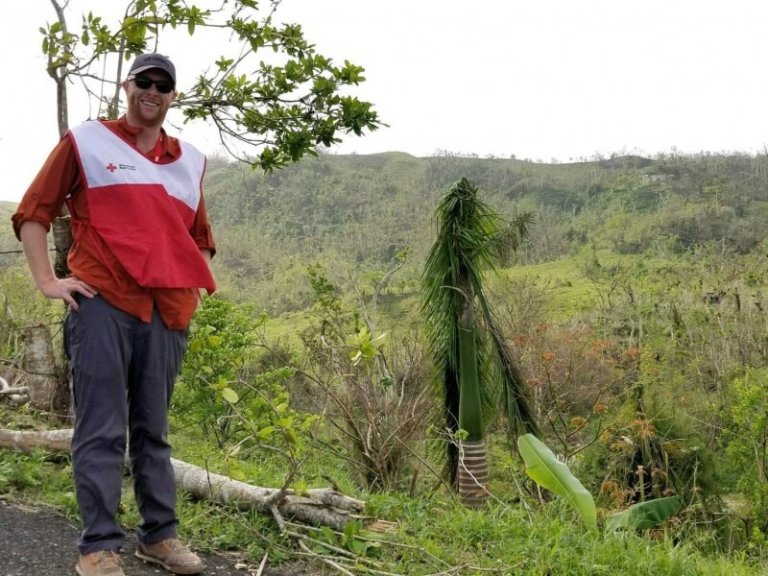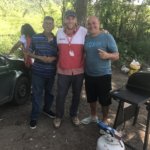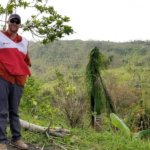When Hurricane Maria roared across Puerto Rico on September 20, 2017, it was the strongest storm to make landfall there in 85 years. Frantic families in the United States spent the next days and weeks trying to reach loved ones, many of them elderly, who had been cut off from contact by the storm. Cameron Patterson ’10 was just one of many Red Cross volunteers working on “Reunification Teams” which were checking on the well-being of stranded Puerto Ricans.
“It meant a lot of driving and a lot of stress because addresses and road names don’t exist anymore—Maria took them away,” Patterson says. “But then you would have these beautiful moments when you found an 88-year-old grandmother and put her on the phone with her son in the U.S.”
When Patterson didn’t have cellular service, he recorded videos of the families, returned to San Juan, and sent them to grateful mainland relatives. “The thing that kept me going was seeing how much it meant to people that someone showed up at their door,” he says. “They knew the Red Cross was thinking about them and looking for them.”
Eventually, Patterson worked himself out of a job, as the Reunification Teams closed more than 1,300 open cases. The Red Cross moved him to working on bulk distribution, filling trucks with food and water at a warehouse and then accompanying the delivery to communities. He navigated “gnarly” mountain roads in Puerto Rico, which he describes as “crazier than Colorado roads” with no trouble. But he confirmed the many reports that lack of power remains the biggest issue in Puerto Rico.
“They’re working to restore power, but it’s going to take years especially in the small mountain communities,” he says. “Without it, they can’t run the water treatment plants, refrigerate food and insulin, take care of people on dialysis. Power is everything.”
Burkina Faso
Patterson had no idea he would end up in Puerto Rico after the hurricane—he fully expected that he would spend fall of 2017 in Burkina Faso, a landlocked country in West Africa, where he had served in the Peace Corps since January 2015. There he worked as a Community Economic Development Volunteer helping local people with a variety of projects. In the village of Cassou, he showed 30 women how to keep chickens. He navigated the countryside on a mountain bike, meeting with cashew farmers who were trying to create a union and teaching them modern beekeeping techniques to help increase their cashew yield. He developed a successful project with 40 farmers, showing them how to grow soy. For everything that local people learned from him, Patterson also learned from them.
“You realize when you come to one of the poorest countries in the world that everything about life is back to basics,” he says. “Americans are ‘go-go-go,’ get things done. I had to force myself to slow down and learn the way of life in Burkina Faso.”
Patterson had extended his Peace Corps commitment by a third year and was working with a small business selling soy seeds to more than 1,000 farmers around Leo in Burkina Faso when, on Sept. 1, life as he knew it ended. He had 30 minutes to pack a bag and leave his village. After two terrorist attacks aimed at ex-patriates in Ouagadougou, the capital of Burkina Faso, the Peace Corps had decided to evacuate all volunteers immediately.
“The Peace Corps had already implemented travel restrictions to the capital in December 2015, before the first attack, but I always felt safe and protected by my village,” Patterson says. “But as terrorist activity rose in the region as a whole, the Peace Corps felt it was best to evacuate to ensure the safety of all the volunteers.”
Evacuated to Ghana, Patterson found that his tenure with the Peace Corps had come to an abrupt and unexpected end. His first act as a private U.S. citizen was to return to Cassou, the village where he had spent more than two years. “I didn’t have time to say good-bye,” he says. “I had been gifted land and built a house there. I had to go back to see everyone I loved and get closure.”
Puerto Rico
In the weeks after he left Africa, Patterson traveled around Europe and Iceland. When he saw that the Red Cross was asking retired Peace Corps volunteers to consider helping in Puerto Rico, he didn’t think long. “I never had been in a disaster area, and that intrigued me,” he says. “I wanted to help people and also challenge myself.”
Patterson attributes his love for travel to CA’s commitment to experiential learning and the six months he spent in Chile when he was at CA. “At CA, teachers were constantly pushing me to open my mind further,” he says. “Studying in Chile, learning Spanish, learning new cultures, that was the moment I got the ‘Wanderlust.’”
Patterson will be heading back to Denver soon. He plans to relax over the holidays, but given his history, he may be on the move soon, motivated by two experiences. He believes he saw the effects of climate change in Africa’s volatile weather—and he doesn’t believe that Puerto Rico was prepared to survive the ferocity of Maria. “I want to devote myself to the environment,” he says. “I want to help people and places be more prepared for climate change.”



